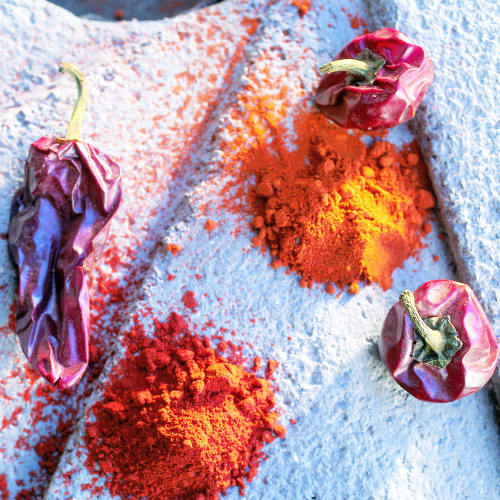About Pimentón de La Vera - Smoked Paprika
January 2004




When Ferdinand and Isabella in the monastery of Guadalupe received Christopher Columbus at the completion of his second voyage to America, they were astonished when he presented them with peppers from the New World. The flavor of the peppers took their breath away, but that did not stop the monks from cultivating them and soon the peppers spread throughout Extremadura. But it was not until the 17th century that Pimentón de La Vera, the milled powder from these peppers, began its general inclusion in Spanish cuisine.
Today the finest paprika powder in Spain is made close to the original monastery garden in the fertile alluvial soils around the Tietar River in La Vera where the climate is mild and the rain is plentiful. Here the farmers cultivate different varieties of the paprika genus Capiscum annum, each with varying degrees of pungency.
The harvest begins in the fall where entire families go out into the fields to harvest the little peppers and place them in drying houses where they are smoke-dried with oakwood which must be about five times as great as the amount of the paprika to be obtained. No other wood may be used if the genuine Pimentón de La Vera is to have its typical taste. The farmer has to go into the smoking house every day for two weeks to turn over the layer of peppers by hand.
Finally the peppers are milled by electrically powered stone wheels which must turn very slowly since friction heat affects the color and flavor. It comes in three varieties: sweet and mild (dulce); bittersweet medium hot (agridulce) and hot (picante) and normally keeps for two years.
The precious powder is indispensable, for many types of Spanish sausage such as chorizo and lomo pork loin. It adds the absolutely perfect taste of authenticity to paellas. It crosses into regular American cuisine as a seasoning for barbecue pork, rich beef and lamb stews, kebabs and even deviled eggs!
Pimentón de La Vera is unique - it is only a distant cousin to the Hungarian paprika that is used for Eastern European dishes. There is no substitute for its use in authentic Spanish cooking.
Related Articles

